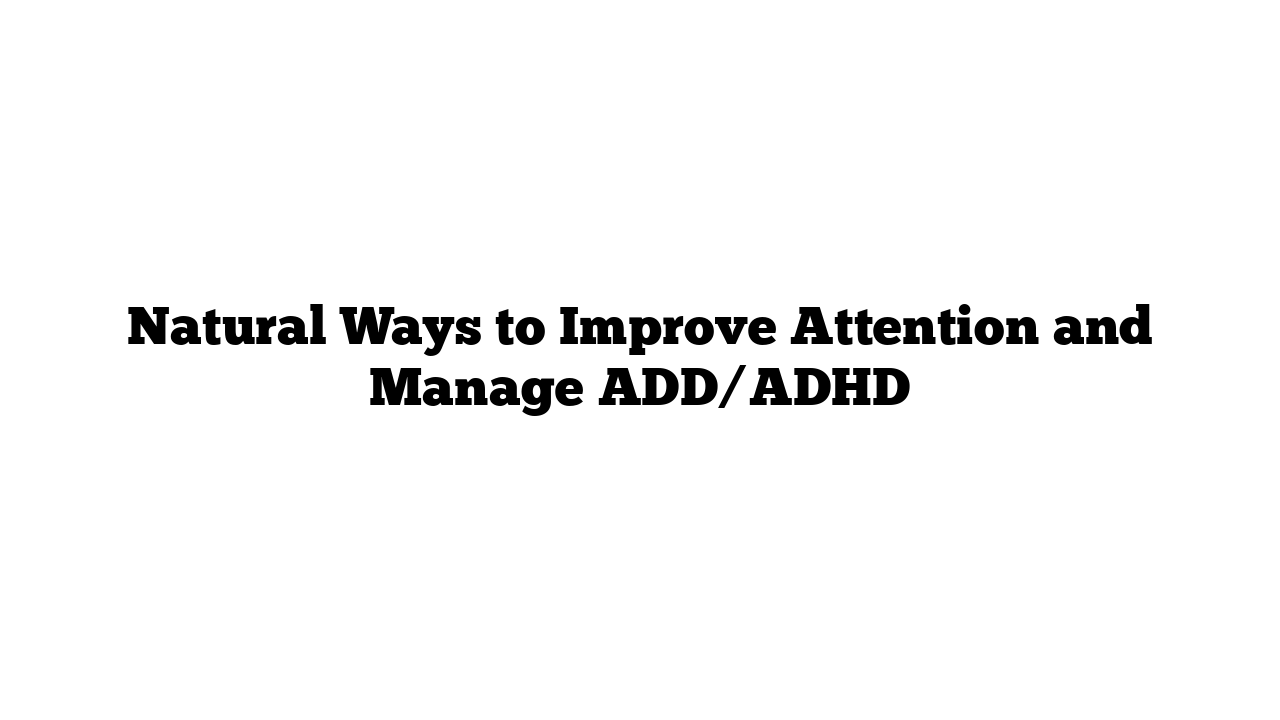Natural Ways to Improve Attention and Manage ADD/ADHD
A New Approach to Focus and Attention
Attention Deficit Disorder (ADD) and Attention Deficit Hyperactivity Disorder (ADHD) are often discussed as complex conditions with numerous challenges in today’s overstimulated world. However, improving attention and managing ADD/ADHD symptoms may not require drastic measures or high-impact medications. There are natural approaches that can enhance focus and overall brain function with minimal side effects, making it possible to build and maintain attention more effectively.
Diagnosing ADD/ADHD: Understanding the Basics
Diagnosing ADD/ADHD relies on criteria from the Diagnostic and Statistical Manual of Mental Disorders (DSM), though some might argue this tool is somewhat outdated. Diagnosing ADD/ADHD isn’t based on a blood test or physical indicators—it’s a subjective process based on observed behaviors. Common signs include difficulty in sustaining attention, hyperactivity, frequent forgetfulness, and impulsive actions.
Living in a world filled with constant notifications, messages, and other distractions, many find themselves struggling with attention. This, coupled with the increasing number of children and adults diagnosed with ADD/ADHD, has led some to wonder: Are these symptoms simply responses to our fast-paced environment?
Factors Contributing to Attention Challenges
- Sensory Overload: Everyday distractions—like smartphones buzzing every few minutes—can train our brains to divide attention rather than focus. This sensory overload can deplete our brain’s natural “attention units,” making it harder to maintain sustained focus.
- Physical Health: Factors like sleep quality, nutrient intake, and even blood sugar levels play major roles in how well our brains can focus. If our brains lack energy, focusing becomes a challenge.
- Medications and Their Side Effects: Medications for ADD/ADHD come with their own concerns. Side effects, potential dependencies, and the complexities of tapering off medications can all impact the decision to begin or continue drug-based treatments.
Natural Solutions for Enhancing Focus and Attention
1. The Ketogenic Diet and Intermittent Fasting
- The brain typically runs on glucose, but it can also use ketones—a byproduct of fat breakdown—for energy. Switching to a ketogenic diet, which is low in carbohydrates and promotes ketone production, may improve mental clarity.
- Lowering carbohydrates helps the body produce ketones, which can act as a cleaner, more efficient fuel for the brain, supporting longer attention spans and reducing mental fog.
2. Addressing Nutritional Deficiencies
- Vitamin B1 (Thiamine): Essential for energy production in the brain, Vitamin B1 helps reduce restlessness and hyperactivity. Nutritional yeast or B1 supplements can be excellent sources.
- Magnesium: This mineral is key for producing ATP (energy) in the brain and calming hyperactivity. Leafy greens are rich in magnesium, though magnesium supplements are available as well.
- Potassium: Adequate potassium intake aids in filtering sensory information, supporting focus. Found in leafy greens and vegetables, potassium is essential for anyone working to enhance their attention.
- Omega-3 Fatty Acids: Particularly DHA and EPA, which are found in fish oils like cod liver oil, support nerve function and brain health. Regularly consuming these can make a notable difference in cognitive function.
3. DMAE (Dimethylaminoethanol) Supplementation
- DMAE, a compound naturally found in sardines, is known to support focus and brain health. It’s particularly effective in enhancing the brain’s ability to process acetylcholine, a neurotransmitter involved in memory and learning.
- DMAE also helps protect the brain from inflammation and oxidative stress, making it a powerful tool in managing ADD/ADHD symptoms. For those interested in natural options, DMAE supplements can be an effective alternative with fewer side effects than traditional medications.
Lifestyle Changes to Support Attention
- Reducing Gluten: Some individuals find that eliminating gluten improves brain function and reduces brain fog. Removing gluten from the diet has been linked to clearer thinking and better focus in some people.
- Sleep Quality: Poor sleep can impair focus, memory, and general brain function. Ensuring adequate, restful sleep is a natural way to support attention and energy levels throughout the day.
- Limiting Caffeine: While caffeine can enhance focus short-term, too much can lead to jitters and reduced concentration over time. Moderation is key.
- Building a Strong Educational Foundation: For children, mastering the basics in subjects like math and reading can prevent frustration and confusion later. A weak foundation can lead to attention challenges as children attempt to learn more complex concepts without understanding the basics.
The Role of Attention in Intelligence
It’s important to distinguish attention from intelligence. Many intelligent individuals have ADD/ADHD, and the condition has nothing to do with intelligence. Intelligence involves reasoning, problem-solving, and adapting to new situations—skills that can be enhanced with a stronger focus and foundation in learning.
Wrapping It Up: Building Better Attention Naturally
With a mix of dietary changes, supplements, lifestyle adjustments, and a strong foundation in learning, attention and focus can be improved without relying solely on medications. ADD/ADHD is manageable, and with natural solutions and a proactive approach, it’s possible to support healthy brain function, enhance focus, and enjoy a greater sense of clarity.
For more helpful insights on health and natural remedies, visit medicaltimes.io.
